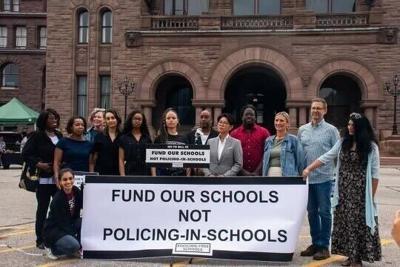As the Ford government is working to require school resource officer programs across the province╠řÔÇö where offered by police╠řÔÇö ╔ź╔ź└▓ police say they will not reinstate their program.
They also left open the possibility that officers will return to some schools in the city.
While ╠řon╠řThursday, Chief Myron Demkiw said the force would not have a “dedicated (school resource officer) program like we used to,” but that schools can call in a neighbourhood community officer (NCO) if they wish.
“We’ve learned that the important investment for us is to get to the local level and respond to community needs the way the community sees fit,” Demkiw said. “And that’s what we do through the NCO program, and through the NCO program the schools get that connectivity” to police.
It’s not new for NCOs to be called into ╔ź╔ź└▓ schools╠řÔÇö╠řthese officers were first introduced in 2013 and serve in 56 of the city’s 158 neighbourhoods╠řÔÇö╠řbut Demkiw’s comments come as the Ford government is trying to require Ontario schools to use the controversial SRO programs wherever they’re offered by local police forces.
The push for more police in schools is one of many controversial provisions of the government’s proposed Bill 33,╠řor the Supporting Children and Students Act.╠řEducation Minister Paul Calandra tabled╠řthe sweeping education bill in June, and the Conservative majority is expected to pass it once MPPs return to Queen’s Park in October.
While supporters of SRO programs say they will make schools safer and help students build relationships with officers, critics say that having police in schools threatens the well-being and education of racialized students, particularly for Black and Indigenous youth.
Since the provincial government first tabled Bill 33 at the end of May, concerned parents and advocacy groups have held rallies against the bill and SRO programs outside Queen’s Park. One rally was held as recently as Thursday.
“We recognize this as a community-led win with the backing of students and labour unions,” Andrea Va╠üsquez Jime╠ünez, director and principal of advocacy group Policing-Free Schools, said of Demkiw’s comments on the SRO program.
“However, this is a singular win towards a larger goal of moving towards an Ontario that has properly funded, supported and resourced policing-free schools.”
Va╠üsquez Jime╠ünez added that Policing-Free Schools believes ╔ź╔ź└▓’s neighbourhood community officers are a “reformed approach to an SRO program” that still have harmful impacts on youth.
“We want (NCO) funds divested and invested into evidence-based measures that actually support the wellbeing of young people,” she said.
╔ź╔ź└▓ police said in an email to the Star that NCOs are not the same as SROs.
“TheyÔÇÖre embedded in neighbourhoods (including schools) and work collaboratively with residents and community agencies to build sustainable solutions to reduce crime and violence, and address conflicts and other issues.”
Police have not responded to the Star’s questions about the reasons for the decision.
In an emailed statement to the Star, Emma Testani, press secretary for Calandra, said the education minister will be meeting Demkiw to “discuss how the ╔ź╔ź└▓ Police Service can help support student safety in ╔ź╔ź└▓ schools.”
School resource officers have not been in ╔ź╔ź└▓ schools since 2017, when the ╔ź╔ź└▓ District School Board voted to end its SRO program after some students reported in a survey that they felt uncomfortable, intimidated and under surveillance with officers in their schools.
TPS previously told the Star that re-implementing its SRO program would require a comprehensive review of needs and resources as part of its annual budget discussions.
The ╔ź╔ź└▓ District School Board declined to comment Friday, while its Catholic counterpart said it will continue to partner with the police, the province and community partners to “ensure students feel safe, welcome and supported in our schools.”
Other GTA police forces have also ended their respective programs in recent years, with making the decision in the aftermath of the murder of George Floyd by Minneapolis police in 2020╠řÔÇö which led to a global reckoning around racial justice and policing.
York police told the Star on Friday there are currently no plans to reintroduce their program, although the force noted it has Youth Engagement Officers who can be called in with two weeks’ notice to give safety-based presentations.
Peel police said they wouldn’t comment, deferring to the school board.
Meanwhile, in Durham, police told the Star on Friday that it relies on “school liaison officers” to “serve elementary and public schools in the area.”
Provincewide, 37 boards across Ontario still have an active SRO program, and that figure is expected to increase once the Ford government’s bill passes.
Until these programs are removed,╠řVa╠üsquez Jime╠ünez said Policing-Free Schools and other concerned parents and groups will continue to rally outside Queen’s Park.
With files from Isabel Teotonio































To join the conversation set a first and last name in your user profile.
Sign in or register for free to join the Conversation